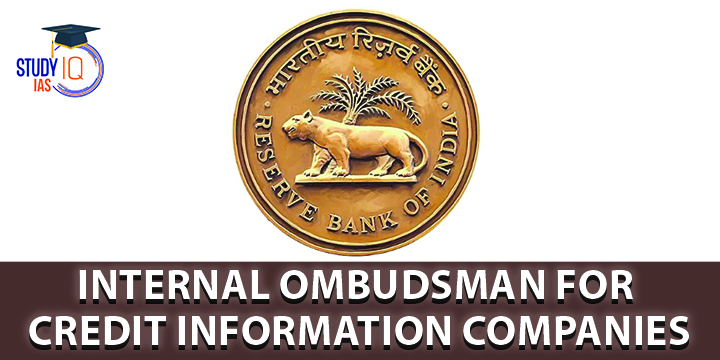Table of Contents
Credit Information Companies in India
A Credit Information Company (CIC) is an organization that collects and analyses credit and loan related data about individuals and companies.
Credit Information Company (CIC) work in India under the Credit Information Companies (Regulation) Act, 2005 by the Reserve Bank of India (RBI).
The organization generates its products and services based on this data. This credit data is provided to Credit Information Company RBI by member banks and other financial institutions.
Functions: Based on individual’s data, a Credit Information Company prepares a Credit Information Report and a Credit Score.
Credit data of companies is used by Credit Information Company (CIC) to prepare a Company Credit Report (CCR).
Significance: When an individual or company applies for a loan, the lender gathers information from CICs to decide whether to grant the borrower the loan.
Ombudsman Meaning and Why is it Needed?
- An ombudsman is an official, usually appointed by the government, to investigate complaints (usually lodged by private citizens) against businesses, financial institutions, universities, government departments, or other public entities. He/she attempts to resolve the conflicts or concerns raised, either by mediation or by making recommendations. This concept originated in Sweden.
- Need for an ombudsman in an organisation:
- Address concerns: Ombudsman gives opportunity for public to express their grievances against an organisation. This feedback will help in improving service to the public.
- Impartial working: Ombudsman Works in an impartial, confidential and independent manner. They function independently without the influence of the organisation.
- Avoid duplication of work: The Ombudsman can carry out single investigation into multiple complaints about the same topic, which avoids duplication and excessive cost.
- Streamlining complaints: Ombudsman tries to establish a procedure for taking and resolving complaints from the public.
- Source of Information: An ombudsman also serves as a source of information about policies and procedures. Serving as an unbiased party, they can promote communication between parties and clarify issues that stifle progress.
- Acts against Power abuse: An ombudsmen help prevent governments from abusing their power, such as imposing unfair laws and exerting controls over their citizens without constraints. They also help restore confidence in the system and its ability to fairly address issues.
Credit Information Companies RBI About Internal Ombudsman Scheme
- The Internal Ombudsman will provide redressal of customer complaints involving deficiency in services rendered by RBI regulated entities.
- The ombudsman shall not handle complaints received directly from the customers or members of the public but only those already been examined by the organization.
- The Internal Ombudsman shall not handle disputes related to:
- Frauds, misappropriation etc., except those resulting from deficiency in service;
- Complaints regarding (a) internal administration, (b) human resources, (c) pay and emoluments of staff;
- Nature of suggestions and commercial decisions of the NBFC;
- Complaints that have been decided by or are pending in fora such as Consumer Disputes Redressal Commission, courts, etc.
- Applicability:
- All Commercial Banks, Regional Rural Banks, Scheduled Primary (Urban) Co-operative Banks and Non-Scheduled Primary (Urban) Co-operative Banks with deposits size of Rs 50 crore and above.
- All Non-Banking Financial Companies (excluding Housing Finance Companies) which are authorized to accept deposits; or have customer interface, with an assets size of Rs 100 crore and above.


 National Technology Readiness Assessment...
National Technology Readiness Assessment...
 Justice Mission-2025: China’s Live-Fir...
Justice Mission-2025: China’s Live-Fir...
 Suryastra: First Made-in-India Long-Rang...
Suryastra: First Made-in-India Long-Rang...

























